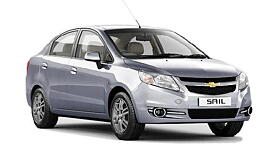Introduction

When Chevrolet introduced the Sail sedan in early 2013, it looked like a promising start for the American automaker. The car was Chinese designed, which meant that it would be cost-effective, cheerful and easy to maintain. However, they did not play their cards right with the sedan and it waddled along without much success.
It did facelift the sedan once during that period but even this did not change their fortunes. Now, there is a second update and they have performed some small cosmetic changes to the car in a bid to inject some mid-life vigour into the model.
The car has always been positioned as a VFM product (more bang for your buck) and it appears that GM has played on these strengths to give the sedan a fighting chance in what appears to be a reviving Indian market.
Exterior
The fascia of the Sail sedan has been carried forward from the previous models but with minor tweaks to give it a slightly different appearance. The most prominent change is the addition of chrome to the fog lamp housing while the more minor modifications include a slightly revised bumper and head lamps.

GM has retained the same side profile from the previous models and this is characterised by a slightly forward leaning posture and flared wheel arches that provide the car with a squat stance. The rear of the Sail sedan retains the same design but now (taking a leaf out of a certain Mumbai based- manufacturers’ book) includes a large chrome strip on the base of the boot door in a bid to up the premium appeal.

The Hyundai Xcent, Honda Amaze and Maruti Suzuki Swift Dzire are the rivals for the Sail sedan. The sportiest looking of the lot is the Honda Amaze while the Hyundai Xcent reflects the most modern design. Maruti Suzuki’s Dzire, unlike its sporty hatchback sibling, looks like an after thought rather than a complete design.
So where does that leave the Sail sedan? The overall design is not exciting as such and it would be easy to lose the car in a crowd (as I did at a super market). However, the design is modern and will appeal to the average mass market consumer whose priority is to use the vehicle for commuting from point A to point B with no major fanfare. However, the sedan has one major selling point which is that it is a proper four metre plus sedan with oodles of space inside but at the price point of a compact sedan. It also looks much more complete and proportionate as compared to its CS siblings whose odd appearance is simply down to the regulations that the manufacturers have had to work within.
Interior
The interior is where Chevrolet has done most of its work in terms of the facelift. It now sports a slightly reworked version of the black and beige two-tone setup which now makes the cabin feel a lot more plush and spacious. The layout of all the elements is the same as the previous model but now the instrument panel gets a funky cyan and blue combination as compared to the older yellow and orange colour scheme.

New to the setup is a two-din music system which has AUX, USB and Bluetooth connectivity as well a CD player. It is definitely a step up from the previous head unit but the lack of steering mounted audio controls and the rather cumbersome arrangement of the buttons on the music system makes it a bit of a handful to use on the go. However, the sound is pretty decent and it does offer some adjustment options for customisation.
An oddity in the design of the steering is the position of the horn. For a country that lives by the ‘beep-beep’ on the road (You can also call this a censor for what is going through the driver’s head when they need to use it) the minute horn buttons located on the outer edges of the centre of the steering wheel take some getting used to. You will find yourself pressing the middle of the steering on many occasions expecting people to react!

As you move over from the driver’s seat to the centre console, you are greeted by the gear lever and the power window switches which have been located here, as most likely a money saving measure.
The AC, much to my surprise, is really good and even looks to be class leading. It cools the cabin quickly and effectively but at higher fans speeds gets really noisy. There is a small space above the glove box to provide additional storage space while the glove box by itself is quite spacious.

Moving to the rear seat allows you to come to terms with the sedans USP-SPACE! The sedan is 4.2- metres and has a wheelbase of 2.46-metres making it the segment leader. There is sufficient leg room in the rear even with the front seats pushed back. It also offers decent under thigh support even for tall people. However, the sedan has a slightly sloping rear roofline which looks good on the outside but consumes headroom on the inside forcing the passengers to sit a little low

Where the cabin loses out the most is the insulation and quality. It is extremely noisy and more so when you are driving at higher speeds. This tends to become significant when you are travelling long distances with the car. On the quality front, all the plastics feel a little downmarket and you can even hear the power window motors in the doors doing their job when you push or pull the buttons. The tactile feel of the switch gear also feels like a let-down. The boot space is pegged at 370- litres for the sedan which is not the largest in the segment but has a wide opening making it easier to load and unload objects.
Engine and gearbox
The Sail sedan is offered with one petrol and diesel engine. The petrol unit is a 1.2-litre mill that produces 82bhp and 108Nm of torque. The diesel on the other hand is the 1.3-litre 'Smartech SDE’ unit that produces 74bhp and 190Nm of torque. Power is sent to the front wheels via a five-speed manual gearbox.

We got to review the diesel- engined version which, for obvious reasons, is the higher -selling model. The engine has a decent low- end power with the turbo coming on at around 1800-1900rpm. A surge can be felt all the way up to around 2600-2700rpm. This is more than sufficient grunt when you need to do a quick overtake.

The gear shifts are not smooth but the changes are firm and reassuring. The low levels of insulations meant that small vibrations and a lot of the engine noise could be felt and heard in the cabin.
What you do get with the sedan are high levels of fuel efficiency. The petrol has an ARAI certified fuel efficiency of 18.2kmpl while the diesel has an ARAI certified number of 22.1kmpl. During the test run, we tanked up the car right to the brim (40 litres) and drove for a significant distance without consuming too much diesel.
GM has fitted the Sail sedan with disc brakes in front and drum brakes on the rear wheels. These provide adequate stopping power and along with the ABS on the top spec versions seem sufficient for vehicles of this size and length.
Ride and handling
Chevrolet has fitted McPherson Struts in the front and Twist Axle setup at the rear. The grouses about the interior being low-rent and looks being bland all fade away into the distance thanks to the ride of this car. It is class-leading and manages to iron out most of the bumps and imperfections on the road with ease.

When the ride is this good, it does affect handling. The steering feels light at low speeds but does not weigh up accurately as you go into the three-digit speeds, more so, it tends to feel jittery when once you go past the 120kmph mark. The low speed handling and light steering on the other hand makes the cars easy to manoeuvre in tight situations and this is, despite its size.
The tyres are 175/70 R14 Apollo Alnac which by the look of it are biased towards efficiency and long life more than performance. They are noisy and this tends to be more so due to the poor insulation.
Verdict

So what is the Chevrolet Sail Sedan? It performs on an average level when it comes to features, quality and looks with each of its rivals donning one of these mantles. Where Chevrolet has managed to pull out an ace is the fact that the sedan does really well when it comes down to comfort, space and fuel efficiency at a really competitive price. These three seem to be on the top of nearly every car buyer’s mind as they tick off the check boxes for ‘paisa vasool’.























